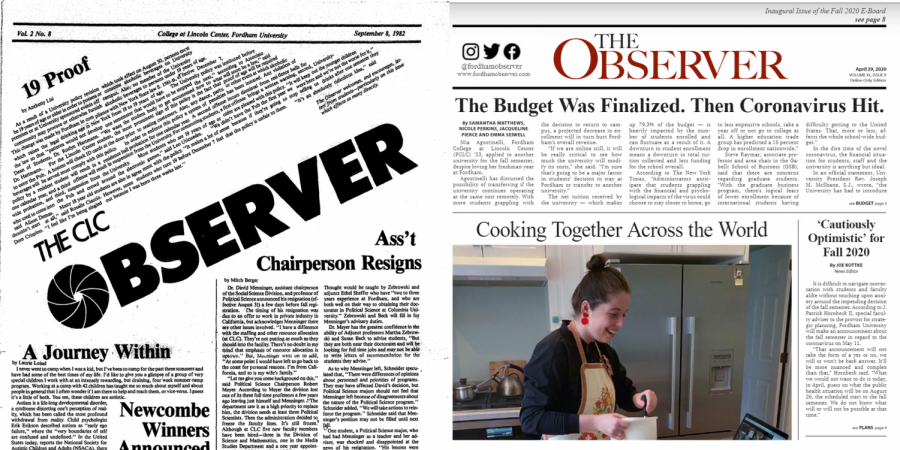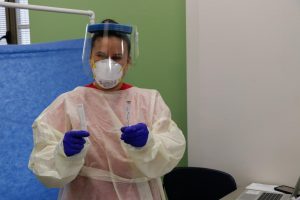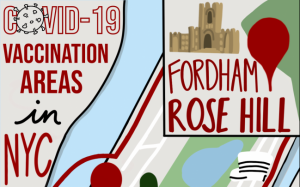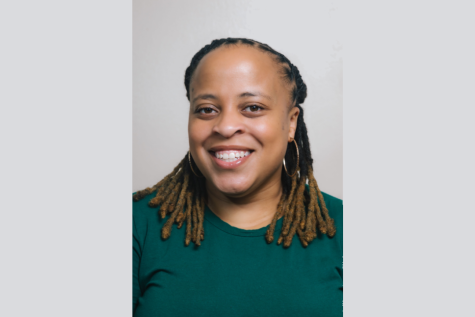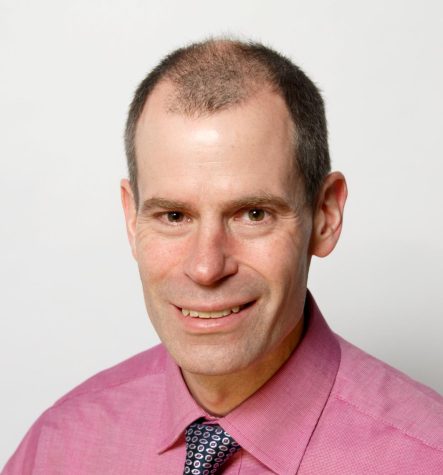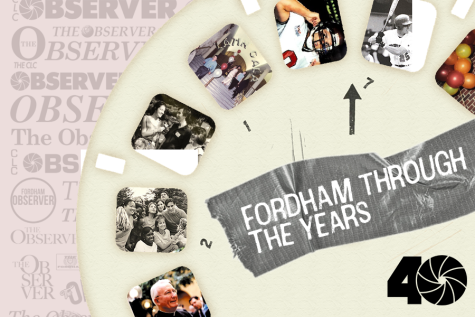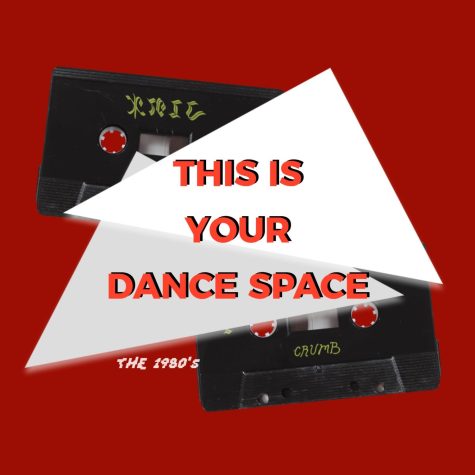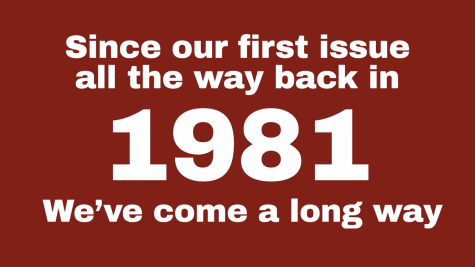Observer Editors-in-Chief: 40 Years Apart
OBSERVER ARCHIVES
Left, Victoria Gioia’s first issue as editor-in-chief in 1982. Right, Sophie Partridge-Hicks’ first issue as editor-in-chief, 2020.
One of the First, 1982: Victoria Gioia
In August of 1982, Victoria Gioia, College at Lincoln Center (CLC) ’83, began her term as one of the first editors-in-chief in Observer history.
A proud Brooklynite, she chose to come to Fordham to study the newly created media studies major. She and her peers attended class in the Lowenstein Center at Lincoln Center, a commuter college notorious among its students for its lack of school spirit and community. (Fordham’s solution to this, the Pub, wouldn’t open until the fall of 1981.)
That all changed in 1980 when she and a group of like-minded individuals saw that the two preexisting publications on campus were being discontinued.
“We said, ‘how could you have a campus without a newspaper?’” she said. Their minds were made up; the students agreed that they would stop at nothing to make sure that the campus had a proper newspaper again. There were 11 students listed as E-Board members in the first issue. In comparison, today’s masthead totals 40 members.
The team put an extreme amount of time into each issue; they had to use a typesetter and input everything into a machine one column at a time. This process is as tedious as it sounds — and it wasn’t helped by the fact that the machine was at the Rose Hill campus.
“We would give up a weekend every two weeks and travel to the Bronx. We were allotted only so many hours to use their equipment, which was an overnight stay for us. We had to learn everything: the typesetting, how to lay out the pages, how to use all the machinery,” Gioia said.
The fight to make The Observer an official newspaper at CLC led to the formation of a community, something that had been sorely lacking among the students. “We were spending 12 to 18 hours together doing the cutting and pasting and everything else to make the paper,” she said. “And then Sunday morning would come, and we had a two-hour ride back on the train, but we could say it was done.”
“Some people’s jobs are to tell their story, and they’re great stories. I wanted to tell a story too — but about the institution.” Victoria Gioia, CLC ’83
This did not go unnoticed by the CLC community. “We were pulling people in from the arts department, people from the history department — it was an eclectic group, but it was happening.” Gioia initially started as a features editor but pursued the position of editor-in-chief for the academic year of 1982-83.
“I wanted it in my heart. I had that condition and drive and I wanted it from day one,” she said. “Some people’s jobs are to tell their story, and they’re great stories. I wanted to tell a story too — but about the institution.” Gioia was successful in her goal and followed in the footsteps of Mitch Berger, CLC ’83, the first editor-in-chief of the paper.
The existence of The Observer was always incredibly tentative, with the team consistently having to display tenacity to keep the club running and full of innovative content.
Gioia echoed this, explaining that the paper “was young and it could have failed at any moment; the fact that 40 years later, it still exists — it makes me feel like I helped create an institution.”
“It was the single most enjoyable experience of my college career.” Victoria Gioia
Gioia went on to work for the New York court system and discovered that her experience at The Observer has helped her.
“The skills that I learned all the way back then are a part of my life every day,” she said. “Everyone still comes to me when they have to write letters or when they need to report on something.”
Ultimately, she looks back at her time on The Observer fondly, and she explained that it was where she and many others found a deep sense of community. “It was the single most enjoyable experience of my college career,” she stated.
Many of the editors-in-chief who followed in Gioia’s footsteps have said the same. Had she and her peers not so determinedly pursued the creation of a newspaper at the Lincoln Center campus, The Observer as we know it — and the experiences that countless students have enjoyed for four decades — would never have come to exist.
Present Day, 2021: Sophie Partridge-Hicks
In March of 2021, Sophie Partridge-Hicks, Fordham College Lincoln Center (FCLC) ’21, was about to graduate while working an internship and leading a newspaper as editor-in-chief during a pandemic.
When she was a first-year, she never expected to write for the newspaper, let alone lead a staff of almost 40 journalists.
During her sophomore year, she was prompted to join the school newspaper by a friend. Just two weeks after writing her first story, she was an assistant news editor.
She never realized how quickly she would come to love the club. “I would spend my days at my internship being like, when can I go to production night, which is the nerdiest thing I’ve probably ever said,” she reminisced. Those long hours solidified the bonds she made with others in the club; despite the upgrade from the typesetters originally used to make the paper, she and her peers spent many long nights on InDesign preparing for print.
“I enjoy this — and apparently, I’m kind of good at it. I’d been looking for something that really resonated with me, and that was when I said, ‘I’m going to be here for a while.’” Sophie Partridge-Hicks, FCLC ’21
She became a full news editor her junior year and found that the growth of her workload came with its own perks. After spearheading a campus-wide sex survey for a special Valentine’s Day issue that garnered an award, she realized, “I enjoy this — and apparently, I’m kind of good at it. I’d been looking for something that really resonated with me, and that was when I said, ‘I’m going to be here for a while.’”
Some of her fondest friendships are with other editors. News Editor Joe Kottke, FCLC ’23, was an assistant news editor while Partridge-Hicks was in the section. “Sophie is my biggest role model in journalism, as well as my newsroom mom,” they said. “She has helped me hone countless skills and inspired me to always push myself.”
Katrina Lambert, FCLC ’22, Partridge-Hicks’ successor as both news editor and editor-in-chief, echoed this sentiment. “What most impressed me about Sophie is her clear vision, which she is never afraid to articulate and pursue,” Lambert said. “The passion she has for The Observer is undeniable.”
Partridge-Hicks’ idea to run started with a realization that “for the next five years after college, I’m going to be someone’s assistant. But now, I had this opportunity to devote myself to this organization that has given so much to me and use my leadership skills to be creative and implement new ideas.”
“The Observer is, by far, hands down, the most influential experience I’ve had at university. The Observer shaped who I am.” Sophie Partridge-Hicks
Starting this new, incredibly work-intensive role in the depths of quarantine wasn’t exactly an ideal beginning. Partridge-Hicks said it hit her only days after accepting the position that any mistake she made would be magnified tenfold in her new position — one year later, she prides herself on responding to these issues with ease.
As for the future, Partridge-Hicks doesn’t know exactly what she wants to do, whether in communications or editorial work at an NGO or organization, but she’s in no rush to figure it out. Her time with the paper has left her with a skillset in social media and in covering breaking news quickly, among others, that she knows will help her out wherever she ends up.
“The Observer is, by far, hands down, the most influential experience I’ve had at university — it does not stack up to any class, any study abroad, any memory. The Observer shaped who I am,” Partridge-Hicks reflected.
Partridge-Hicks is excited to see the next great things that the staff of The Observer gets up to: “If The Observer is not celebrating its 80th anniversary, I will be writing some aggressive emails.”
In the end, she is most appreciative of what The Observer has allowed Fordham students to do year after year: “No one is inherently qualified to do this; everyone is slowly learning along the way. There’s this really beautiful lineage of students just continuing to keep pushing forward time after time.”
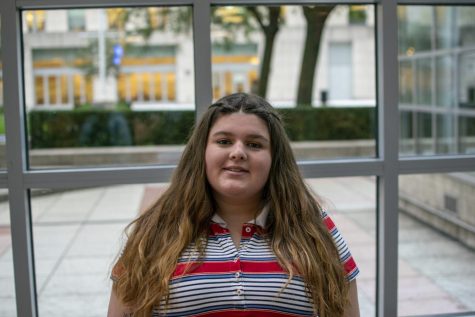
Nicole Perkins, FCLC ‘22, is the fun and games editor at The Observer. She is currently majoring in political science and visual arts. When she is not desperately trying to finish the NYT mini crossword, you can find her taking photos, walking around downtown Manhattan, or trying out a new recipe while making an absolute mess in her kitchen.

